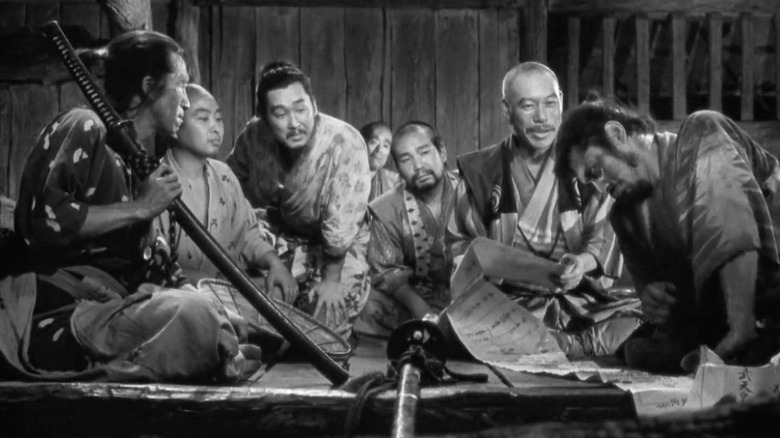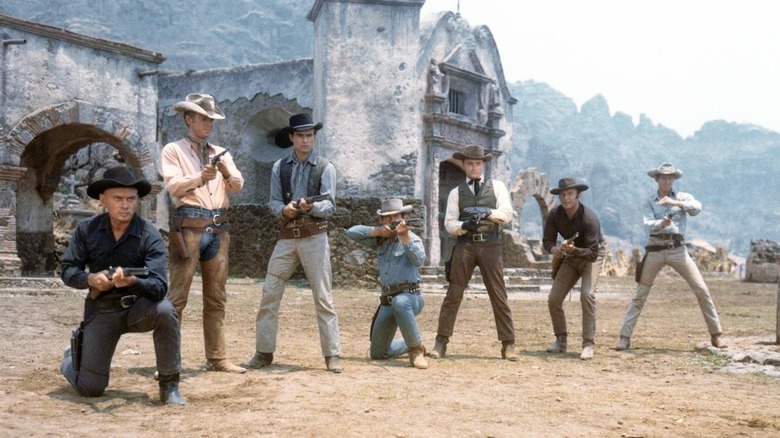How Akira Kurosawa Really Felt About The Western 'Copy' Of His Classic Seven Samurai
When Akira Kurosawa, Shinobu Hashimoto, and Hideo Oguni were writing the screenplay for their 1954 epic "Seven Samurai," they couldn't have predicted its lasting influence on cinema. Not only did Kurosawa's masterful direction alter and revolutionize the way action sequences would be shot, but the premise became a reliable and lasting template that multiple other filmmakers would employ in the ensuing decades. For those unlucky enough to have never seen "Seven Samurai," the setup is simple: a remote farming village is regularly looted by passing bandits, leaving them destitute. Unable to withstand another attack, the villagers gather up their modest means and hire seven rogue samurai to protect them. The samurai know that the job won't pay, but each one has their own reasons for joining the cause. Using their cunning and limited means, the samurai repel the bandit attack.
Most recently, the "Seven Samurai" premise was transposed onto Zack Snyder's "Rebel Moon." It had also previously been used in the sci-fi film "Battle Beyond the Stars," the comedy films "¡Three Amigos!," "A Bug's Life," and "Galaxy Quest," the wuxia film "Seven Swords," and the 1970 actioner "The Invincible Six."
Most famously, John Sturges adapted "Seven Samurai" into a Western with his 1960 film "The Magnificent Seven." That film starred Yul Brynner, Steve McQueen, James Coburn, Charles Bronson, Robert Vaughn, Horst Buchholtz, and Brad Dexter as seven deadly gunslingers who off against an evil bandit lord played by Eli Wallach.
Many were curious what Kurosawa might have thought of "The Magnificent Seven," and he revealed his opinion in a 1966 interview with R.B. Gadi (handily printed in the invaluable book "Akira Kurosawa Interviews," edited by Bert Cardullo). It seems Kurosawa found it entertaining, but disappointing.
Kurosawa was partial to European films
Kurosawa admitted that he didn't retain many American films. When he did watch John Sturges' adaptation of his script, he felt that it was far enough removed that it couldn't even be considered an adaptation. Perhaps Kurosawa felt that his film was too closely tied to feudal Japan to be considered adaptable. The director admitted:
"The American copy is a disappointment, although entertaining. It is not a version of 'Seven Samurai.' I do not know why they called it that. Oh, but I do enjoy some American films. [...] But I do not remember their titles. I am partial to European films."
Kurosawa then mentioned that he enjoyed the films of Federico Fellini and Vittorio De Sica. He also liked the work of American director Elia Kazan and Albert Lamorisse's celebrated French short film "The Red Balloon." One had to admire Kurosawa's dismissive attitude; he'd certainly earned the right to brush off films that didn't concern him.
Kurosawa's comments contradict other stories about his reception to "The Magnificent Seven," however. According to William V. Costanzo's 2014 book "World Cinema Through Global Genres," Kurosawa watched "The Magnificent Seven" and immediately sent Sturges a samurai sword as a gift, presumably because the director was so impressed with Sturges' work.
Kurosawa frequently saw his films remade in his lifetime. Famously, Sergio Leone's "A Fistful of Dollars" ripped off his 1961 film "Yojimbo" without asking permission. "Yojimbo" also inspired "Django," "The Warrior and the Sorceress," Albert Pyun's "Omega Doom," and Walter Hill's "Last Man Standing." Most recently, Oliver Hermanus adapted Kurosawa's classic "Ikiru" into the drama "Living."
Kurosawa passed in 1998, but, as mentioned, his film continue to inspire new screenwriters all over the world. It will be hard, however, to ever truly top "Seven Samurai."

